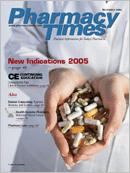Publication
Article
Pharmacy Times
Lyrica (pregabalin)
Pain has various causes and, attimes, may be very difficult tocontrol. Diabetic peripheralneuropathy (DPN) and postherpeticneuralgia (PHN) are among the mostpoorly controlled forms of pain. DPNis common in long-standing diabetespatients, with a prevalence approaching50% in those with the disease for>25 years.1,2 PHN generally refers topain persisting beyond 4 months fromthe offset of the rash and is commonin the elderly population.3 DPN andPHN are both treated with antidepressants,anticonvulsants, tramadol, opioids,and topical capsaicin.4 Unfortunately,data supporting these clinicalinterventions is often conflicting andlimited. Lyrica, manufactured by Pfizer,was recently approved for the treatmentof DPN and PHN and as anadjunct for partial seizures.5
Pharmacology
Lyrica is a lipophilic analogue ofgamma-aminobutyric acid (GABA)substituted at the 3-position to facilitatediffusion across the blood-brainbarrier. Its pharmacologic effects originateat the alpha-2-delta binding site.6This interaction causes a reduction indepolarization-induced calcium influxat nerve terminals, thus reducing therelease of neurotransmitters. AlthoughLyrica is structurally related to GABA,it does not share pharmacologic propertieswith GABA. It also lacks activityon benzodiazepine receptors.7
Clinical Trials
The safety and efficacy of Lyrica wereevaluated for the treatment of PHN inan 8-week multicenter, randomized,placebo-controlled trial. Patients withPHN (n = 173) were randomized toreceive either 600 mg of Lyrica daily(creatinine clearance [CrCl] >60mL/min) or 300 mg of Lyrica daily(CrCl = 30-60 mL/min). The resultsshowed that Lyrica-treated patientshad a greater decrease in pain, comparedwith placebo. Sleep also improvedin patients treated with Lyrica,compared with placebo, as well as ClinicalGlobal Impression scores(P<.0001). Researchers concluded thatLyrica was more effective for relief ofpain and sleep interference, and itexhibited a better global improvementthan placebo in the treatment of PHN.8
A multicenter, randomized, doubleblindtrial compared Lyrica (300mg/day) with placebo for the treatmentof adult patients with DPN overan 8-week period. Inclusion criteria forthe study were consistent with DPNdiagnosis accepted by the AmericanDiabetes Association. There was a significantreduction in the mean painscore between the Lyrica (2.5) and theplacebo (0.8) groups at the end of thestudy. Investigators found that Lyricawas effective in relieving pain associatedwith DPN, as well as in improvingoverall mood, sleep disturbance, andquality of life.9
Three fixed-dose, randomized, double-blind, placebo-controlled, multicentertrials were conducted to evaluatethe effectiveness of Lyrica as anadjunct treatment in patients withrefractory partial seizures. Polledanalysis of these trials reported a41.3% improvement from baseline in28-day seizure-free rate.10-12
Safety
The most common adverse effectsreported from the trials were dizziness,somnolence, weight gain, peripheraledema, blurred vision, diplopia, headache,ataxia, and gastrointestinal disturbances.8-12 Lyrica is in FDA pregnancycategory C.5 Dose adjustment isrecommended in patients with CrCl<60 mL/min.6
Outlook
The recommended starting dose ofLyrica is 150 mg daily, given in 3 divideddoses, with a maximum dose of 600 mg.5Lyrica appears to be a valuable additionto the treatment of painful DPN, PHN,and partial seizures. It also is showingpromising results in the treatment ofgeneralized anxiety disorder, fibromyalgia,social phobia, and osteoarthritis. Itcould prove to be very useful in themanagement of pain, epilepsy, and anxietydisorders.
Drs. Faria and Soo are both senior researchpharmacists with the Investigational DrugService at Brigham and Women's Hospital,Boston, Mass. Dr. Faria also is a seniorhuman research specialist with PartnersHealthCare System. Simon Gorelikovis a sixth-year PharmD candidate fromNortheastern University currently onclinical clerkship in the Investigational DrugService at Brigham and Women's Hospital.
For a list of references, send astamped, self-addressed envelope to:References Department, Attn. A. Stahl,Pharmacy Times, 241 Forsgate Drive,Jamesburg, NJ 08831; or send an e-mailrequest to: [email protected].

Newsletter
Stay informed on drug updates, treatment guidelines, and pharmacy practice trends—subscribe to Pharmacy Times for weekly clinical insights.






